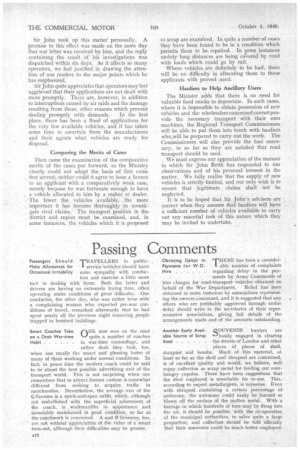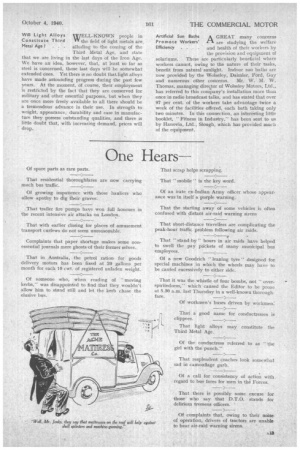Passing Comments
Page 14

Page 15

If you've noticed an error in this article please click here to report it so we can fix it.
Passengers Should TRAVELLERS in public Make Allowances for service -vehicles should have Occasional Irritability some sYmpathy with conduc
tors and exercise a little more tact in dealing with them. Both the latter and drivers are having an extremely trying time, often operating under conditions of great difficulty. One conductor, the other day, who was rather terse with a complaining woman who expected pre-war conditions of travel, remarked afterwards that he had spent nearly all the previous night removing people trapped in bombed buildings.
Smart Coaches Take nNE now sees on the road
on a Drab War-time quite a number of coaches Habit in war-time camouflage, and
rather drab they look, too, when one recalls the smart and pleasing lustre of many of them working under normal conditions, in fact, in peace time the modern coach could be said to be about the best possible advertising unit of the transport 'world. This is not surprising when one remembers that to attract human custom is-somewhat different from seeking to acquire traffic in merchandise. Nevertheless, the average van of the C-licensee is a spick-and-span outfit, which, although not embellished with the superficial adornment of the coach, is workmanlike in appearance and invariably maintained in good condition, so far as the coachwork is concerned. A and B licensees, too, are not without appreciation of the value of a smart turn-out, although their difficulties may be greater. al2 Obviating Relays in r-rHERE has heen a consider•
Payments for W. D A able number of complaints Hire regarding delay in the pay ments by Army Commands of hire charges for road-transport vehicles obtained on behalf of the War Department. Relief has been . obtained in some instances by associations represent
. ing the owners concerned, and it is suggested that any . others who are justifiably aggrieved through undue . delay should write to the secretaries of their representative associations, giving full details of -the arrangements made and of the amounts outstanding.
Another Easily AvailQOUVENIR hunters are able Source of Scrap "Jbusily engaged in clearing Steel the streets of London and other
places of pieces of shell, shrapnel and bombs. Much of this material, at least -so far as the shell and shrapnel are concerned, is of excellent quality and would, we believe, well repay collection as scrap metal for feeding our everhungry cupolas. There have been suggestions that the steel employed is unsuitable for re-use. This, according to expert metallurgists, is nonsense. Even with shrapnel containing a certain peicentage of antimony, the antimony could easily be .burned or blown off the surface of the molten metal. With a barrage in which hundreds of tons may be flung into the air, it should be possible, with the co operation . of the municipal authorities, to salve quite a large proportion, and collectors should be • told officially that their souvenirs could be much better employed.
Will Light Alloys Constitute Third Metal Age? . . .
WELL-KNOWN people in VI, the field of light metals are alluding to the coming of the Third Metal Age, and state that we are living in the last days of the Iron Age. We have an idea, however, that, at least so far as steel is concerned, those last days will be somewhat extended cMes. Yet there is no doubt that light alloys have made astounding progress during the past few years. At the moment, of course, their employment is restricted by the fact that they are conserved for military and other essential purposes, but when they are once more freely available to all there should be a tremendous advance in their use. In strength to weight, appearance, durability and ease in manufacture they possess outstanding qualities, and there is little doubt that, with increasing demand, prices will drop.
Artificial Sun Baths Promote Workers' Efficiency . . . .
AGREAT many concerns • are studying the welfare and health of their workers by the provision and equipment of solariums. These are particularly beneficial where workers cannot, owing to the nature of their tasks, benefit from natural sunlight. Indoor sun baths are now provided by the Wolseley, Daimler, Ford, Guy and numerous other concerns. Mr. W. M. W. Thomas, managing director of Wolseley Motors, Ltd., has referred to this company's installation more than once in radio broadcast talks, and has stated that over 97 per cent. of the workers take advantage twice a week of the facilities offered, each bath taking only two minutes. In this connection, an intereSting little booklet, "Fitness in Industry," has been sent to us by Hanovia, Ltd., Slough, which has provided much of the equipment.




















































